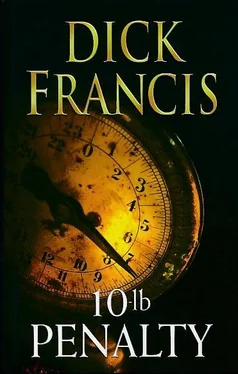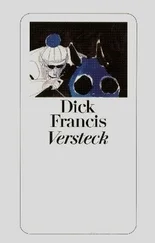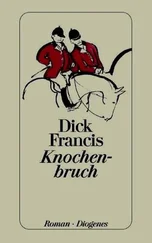Dick Francis - 10 lb Penalty
Здесь есть возможность читать онлайн «Dick Francis - 10 lb Penalty» весь текст электронной книги совершенно бесплатно (целиком полную версию без сокращений). В некоторых случаях можно слушать аудио, скачать через торрент в формате fb2 и присутствует краткое содержание. Город: London, Год выпуска: 1997, ISBN: 1997, Издательство: Michael Joseph, Жанр: Триллер, на английском языке. Описание произведения, (предисловие) а так же отзывы посетителей доступны на портале библиотеки ЛибКат.
- Название:10 lb Penalty
- Автор:
- Издательство:Michael Joseph
- Жанр:
- Год:1997
- Город:London
- ISBN:978-0-7181-4245-2
- Рейтинг книги:3 / 5. Голосов: 1
-
Избранное:Добавить в избранное
- Отзывы:
-
Ваша оценка:
- 60
- 1
- 2
- 3
- 4
- 5
10 lb Penalty: краткое содержание, описание и аннотация
Предлагаем к чтению аннотацию, описание, краткое содержание или предисловие (зависит от того, что написал сам автор книги «10 lb Penalty»). Если вы не нашли необходимую информацию о книге — напишите в комментариях, мы постараемся отыскать её.
10 lb Penalty — читать онлайн бесплатно полную книгу (весь текст) целиком
Ниже представлен текст книги, разбитый по страницам. Система сохранения места последней прочитанной страницы, позволяет с удобством читать онлайн бесплатно книгу «10 lb Penalty», без необходимости каждый раз заново искать на чём Вы остановились. Поставьте закладку, и сможете в любой момент перейти на страницу, на которой закончили чтение.
Интервал:
Закладка:
She said tearfully, trying to wipe blood with her fingers, “Have you got a tissue?”
I hadn’t.
“There’s one in my bag.”
Her handbag, I knew, was in the Range Rover.
“I’ll get it,” I said.
“No... Benedict... don’t leave me.”
“Call an ambulance,” the truck driver advised bullishly. “I missed her, I know I did. It’s not my fault she’s bleeding.”
“No, it’s not,” I agreed, standing up. “But you’re a big strong guy and you can help by picking up the lady and carrying her to that goldish Range Rover over there.”
“No fear,” he interrupted. “I’m not getting her blood on me, it’s not my sodding fault, she ran straight out in front of me.”
“Yes. OK,” I said. “It wasn’t your fault. But you did at least stop, so if you’d help and take her along to that vehicle, and if I just jot down your name and the firm you work for, that owns the truck, then I’m sure you can carry on with whatever you were doing.”
“No police,” he said.
“You don’t have to call the police to an accident unless someone’s been injured, and you didn’t injure this lady, as you said.”
“Straight up? How do you know that? You’re only a boy.”
I’d learned it in the course of reading for my driving license, but I couldn’t be bothered to explain. I bent down and tried to get Orinda to her feet, and she stood up shakily, clutching me to stop herself from falling.
I put my arms around her awkwardly. She was trembling all over. My father would simply have scooped her up and carried her to the Range Rover, but apart from my doubt of having adequate strength, I was embarrassed by the difference in our ages. Ridiculous, really. I felt protective, but unsure.
A couple of cars went by, the passengers craning their necks with curiosity.
“Oh, come on, missus,” the driver said suddenly, picking up her scattered shoe and putting it on for her, “hold on to my arm.”
He offered her a rocklike support, and between the two of us Orinda walked unsteadily, setting her feet down gingerly as if not sure where the ground lay. In that fashion we reached the Range Rover and installed Orinda in the front passenger seat, where she relaxed weakly and thanked the driver.
“Hey!” he said suddenly, surveying the highly noticeable vehicle. “Doesn’t this motor belong to that politician? Some funny name?”
“Juliard.”
“Yeah.”
“I’m his son,” I said. “This lady, that you cleverly missed hitting, and that you’ve helped just now, she is Mrs. Orinda Nagle, whose husband was the MP here before he died.”
“Cor!” Surprise at least stopped the whine of self-justification. I reckoned he was already rehearsing a revised tale to his masters. “I live in Quindle,” he said. “They say your father’s got no chance, the way things are, but maybe I’ll vote for him now anyway. Can’t say fairer than that!”
I wrote down his name, which he gave willingly, and the name of the furniture firm he worked for, and the telephone number, and he positively beamed at Orinda and told her not to worry, and drove off in his truck giving us a smile — a smile — and a wave.
Alderney Wyvern, all this time, had remained, as if the soles of his shoes were glued to the ground.
A few people had come out of the houses because of the noise of horn and brakes, but as there’d been no actual crash, and as Orinda had stood up and walked away, their curiosity had died quickly.
For once, with a real story to record, Usher Rudd and his lens had been missing.
My father, Mervyn, Faith and Lavender came out from a triumphant conversion of the retirement home and exclaimed in horror at Orinda’s blood and distress. The tissue from her handbag had proved inadequate. Her tears by now were of uncomplicated misery, rolling half-mopped down her cheeks.
“What happened?” my father demanded of me fiercely. “What have you done?”
“Nothing!” I said. “I mean... nothing.”
Orinda came to my defense. “George, Benedict helped me... I can’t believe it...” Her voice wailed. “Alderney... Alderney ... h-h-hit me.”
“He what?”
We all looked along the road to where Wyvern still pugnaciously stood his ground, and if I had needed an explanation of the emotions involved, my father didn’t. He strode off with purposeful anger towards the visibly unrepentant ex-best friend and challenged him loudly, though we couldn’t hear the actual words. Wyvern answered with equal vigor, arms waving.
“Benedict...” Orinda begged me, increasingly upset, “go and stop them.”
It was easy enough for her to say it, but they were both grown men whereas I... Well, I went along there fast and caught my father’s arm as he drew back his fist for an infuriated swipe at Wyvern who was, incredibly, sneering.
My father swung around and shouted at me, raging, “Get out of my bloody way.”
“The pact,” I yelled at him. “Remember the pact.”
“What?”
“The pact,” I insisted. “Don’t hit him. Father... Dad... don’t hit him.”
The scorching fury went out of his eyes as suddenly as if he were waking up.
“He wants you to hit him,” I said. I didn’t know how I knew or why I was so certain. It had something to do with the fact that Wyvern had remained on the spot instead of driving off, but it was mostly intuition derived from his body language. He was looking for trouble. He meant all sorts of harm to my father, not least adverse publicity before polling day.
My father gave me a blank look, then walked past me to go back to the Range Rover. I half turned to follow him but was grabbed and spun ’round by Wyvern, whose always unsmiling face was now set fast with brutal malice. If he couldn’t get what he wanted from the father, he would take it out on the son.
I hadn’t learned boxing or karate, but I did have naturally fast reflexes and, thanks to riding and skiing, an instinctive command of balance. Wyvern might have had weight in his fists, but I ducked and dodged two sizzling punches to the face that would have laid me out flat if they’d connected, and concentrated solely on staying on my feet.
He drove me back against the shoulder-height rough stone wall that divided a garden from the sidewalk, but I squirmed out of his grasp and simply ran, intent on escape and containment, not on winning any battles.
I could hear Wyvern coming after me, and saw my father with renewed fury turning back to my aid.
I yelled at him in frenzy, “Get in the Range Rover. Get in the vehicle,” and he wavered and turned again and marvelously did as I said.
Three steps from the Range Rover I stopped running and swung around fast to face Wyvern, in whom calculation had never been wholly overwhelmed by emotion: he sized up the gallery he was playing to — Orinda, my father, Mervyn, Faith and Lavender — and under the glare of all those sets of eyes he abruptly conceded that further attack would have legal consequences he wouldn’t relish and stopped a bare six paces from where I stood.
The venom in his expression shriveled the saliva in my mouth.
“One day,” he said, “I’ll get you one day.”
But not today, I thought, and today was all that mattered.
He took a few steps backwards, his face smoothing out to its customary flatness, then he turned and walked towards his car as if nothing had happened. Easing into the driver’s seat he started the engine and drove collectedly away with no burning of tires or other histrionics.
He left a lot of speechlessness in and around the Range Rover.
In the end Mervyn, clearing his throat, said, “Orinda needs a doctor.”
Orinda disagreed. “I need a tissue.”
Читать дальшеИнтервал:
Закладка:
Похожие книги на «10 lb Penalty»
Представляем Вашему вниманию похожие книги на «10 lb Penalty» списком для выбора. Мы отобрали схожую по названию и смыслу литературу в надежде предоставить читателям больше вариантов отыскать новые, интересные, ещё непрочитанные произведения.
Обсуждение, отзывы о книге «10 lb Penalty» и просто собственные мнения читателей. Оставьте ваши комментарии, напишите, что Вы думаете о произведении, его смысле или главных героях. Укажите что конкретно понравилось, а что нет, и почему Вы так считаете.












